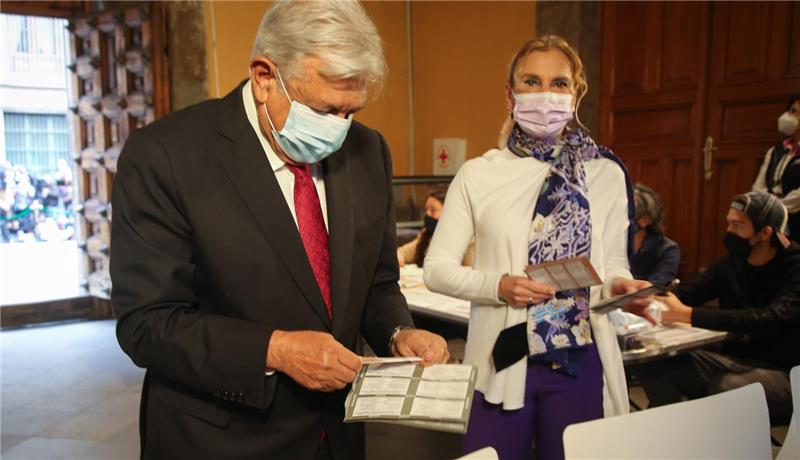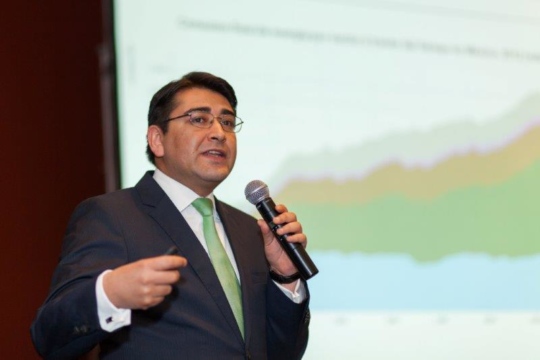A Conversation with Josefina Vázquez Mota
With primary elections approaching, the candidates vying for their parties’ nomination are making their agendas heard.
A Daily Publication of The Dialogue
Mexican President Andrés Manuel López Obrador’s coalition retained control of Congress but appeared to lose its supermajority in the lower chamber, according to preliminary results from Sunday’s midterm elections. The president’s Morena party also was poised to expand its number of governor’s offices. Sunday’s election has been marred by violence, including nearly 100 political assassinations leading up to the vote. What do the results mean for López Obrador and the policies he wants to push? What do the results say about how much Morena will remain a political force even after López Obrador’s term ends three years from now? What are the most important state races, and what do their results mean for local and national policy?
Nicolás Mariscal, member of the Advisor board and chairman of Grupo Marhnos in Mexico City: “The importance of these elections—the biggest in Mexico’s history—lies in the turning point they represent for President López Obrador and his Morena party. After the 2018 election, the party held 253 seats (51 percent) in the lower chamber, and now that figure will shrink to 190-202 seats. Even though the ruling party will still be the dominant force in the next legislature, the coalition will fall short of the two-thirds majority required to approve major or constitutional changes, which will hinder López Obrador’s ambitious agenda of returning to a more centrist, conservative and populist model. However, the opposition cannot claim victory. Morena may have lost seats in Congress but will likely win at least nine out of the 15 governorships at stake, becoming the dominant force in state governments, with half of them under its belt since 2018. Some states such as Colima and Baja California Sur, where other parties have governed for decades, opted for a new alternative. The coalition made major gains in state and local electoral offices, expanding national reach and solidifying a party that was founded less than a decade ago. There is a political division between northern and southern states. Nonetheless, Morena lost the majority of the municipalities in Mexico City, a longtime stronghold for Morena and allies, and a state that is currently governed by one of the potential successors to López Obrador. Not all votes have yet been counted. So far, preliminary numbers portray mixed results. The opposition gained seats but lost state and local offices. Apparently, many Mexicans remain hopeful of the legacy López Obrador and his party might leave, but voters decided to level the field in Congress. Perhaps what people want is to make sure Morena seeks allies in opposing parties to jointly pass major legislation, while still adhering to its promises and commitments.”
Andrés Rozental, member of the Advisor board, president of Rozental & Asociados in Mexico City and senior policy advisor at Chatham House: “Many Mexicans breathed a sigh of relief after the preliminary results of the country’s midterm elections were announced late on Sunday night. Although President López Obrador’s Morena movement gained territorial advantage by winning additional state governorships previously held by the PRI and PAN parties, it lost a significant number of seats in the lower house of Congress and suffered a stinging defeat in Mexico City, where it has historically controlled a great majority of municipalities. The main goal of opposition parties going into the elections was to deprive AMLO of his supermajority in the Chamber of Deputies, thus making it extremely difficult for him to further his stated objectives of reforming Mexico’s constitution, reversing the reform approved in previous administrations opening the energy sector to private investment and pushing his often-regressive economic agenda. Although the run-up to polling day was marred by a record number of assassinations and violence directed at candidates who publicly vowed to fight drug cartels and organized crime, the election itself took place peacefully and with almost no disruptive incidents to report. It is doubtful that López Obrador will take the election results as a clear sign to change his so-called ‘fourth transformation’ strategy, but it will be much more difficult for him to repeat his ramming-through of laws and regulations in a Congress where he lacks the two-thirds needed to approve significant changes. He will undoubtedly continue trying to achieve his objectives through executive actions, but the judiciary has so far proved a formidable obstacle to the patently unconstitutional nature of many of these presidential decrees.”
Vanessa Rubio-Márquez, former member of Mexico’s Senate and deputy government minister: “Although Sunday’s elections were peaceful, we must not forget that 36 candidates were assassinated in the process. The analysis of this complex election is filled with nuance. The opposition (PAN, PRI and PRD) performed well in congressional races, as it was able to impede Morena and its allies from winning a qualified majority. But Morena, together with the Green and Labor Parties (Verde and PT), will still be able to propose or change any legislation. At the local level, Morena won 11 out of the 15 gubernatorial seats that were up for grabs, and one more will be headed by its ally, the Green Party. Morena also outperformed in local legislatures. This midterm election certainly reshuffled national and local political geographies. Verde and Movimiento Ciudadano (MC) will be new power factors as the former is key for Morena’s simple majority in Congress. It will support, for instance, the budget proposal that will be presented in September, and MC will govern one of the centers of entrepreneurial activity in the country and the third-largest entity in terms of contribution to national GDP. Morena will remain the biggest political force in Congress with a very similar and possibly larger number of deputies than it obtained in 2018 (190). It will also be the political party that governs the largest number of states (16). Rather than moving toward a more moderate path, the president will most likely, with the support of his party, double down on its policies on energy, the statization of Pemex and CFE, stronger regulation of economic activity, a wider participation of the army in tasks beyond security and the undermining of independent and technical institutions.”
Lorena Becerra, political analyst and head of polling at Grupo Reforma: “Sunday’s elections represented an important limit that voters imposed on President López Obrador in the legislative arena. He will have to negotiate with opposition parties to pass constitutional reforms and to push forward specific appointments. Additionally, he requires the support of the Green Party—his newest electoral ally—to pass regular laws because Morena on its own does not hold the 50 percent-plus-one majority needed in the lower chamber. This automatically means López Obrador will have to reconsider his more radical stance on specific areas, starting with the fiscal reform he intends to pass before the end of the year. Morena also lost an important part of Mexico City, a territory traditionally favorable to López Obrador. In contrast, Morena outperformed expectations in the gubernatorial races, winning 12 out of the 15 elections. The president is not traditionally known for being keen on negotiating with the opposition, so he might try to use his new political leverage on the state level to pressure Congress. Furthermore, the June 6 election demonstrated that there is an important opposition sentiment growing in the electorate, which anticipates an interesting presidential race in 2024 if the opposition parties can fulfill the expectations they created with good governments and concrete results.”
Jonathan Hiskey, associate professor of political science at Vanderbilt University: “Sunday’s elections in Mexico offered reasons both for hope and dismay across the political spectrum. For President López Obrador and his supporters, the impressive showing of Morena in state and local elections, particularly its apparent victory in at least 10 of the 15 gubernatorial contests, suggests a deepening and further consolidation of the party’s hold on Mexican politics. These victories, however, perhaps raise fears among critics of López Obrador that the party’s widening control of state governments may allow for the re-emergence of the dominant-party political machines that characterized the country’s one-party past. Conversely, Mexico’s fractured opposition can find some measure of hope in its collective showing in federal deputy elections that diminished Morena’s control over Congress. The opposition, though, must still confront its inability to connect with a majority of Mexicans and offer a coherent alternative to the López Obrador government. Finally, for proponents of democracy in Mexico, the fact that the elections took place at all, in the face of myriad obstacles, is encouraging. Further, the inability of Morena to obtain a supermajority in the Chamber of Deputies suggests a repudiation to some degree by Mexican voters of the anti-democratic tendencies that many view as characteristic of López Obrador’s first three years in office. Whether or not these elections do in fact serve to moderate those tendencies for the remaining three years, or further reveal them, remains to be seen.”
Falko Ernst, senior analyst for Mexico at International Crisis Group: “With Morena having lost its absolute congressional majority, López Obrador will struggle to deliver on his promises of a sweeping overhaul of the Mexican state, economy and society. Power at the federal and state level is now more evenly distributed between the opposition and Morena. The next three years are likely to bring more polarization and constant negative campaigning from both. Criminal and other private interests have once again leveraged elections to sustain and further augment their influence. With lines between state and crime porous, public policies will continue to be distorted in practice—regardless of what they are intended to accomplish. Morena remains the political force to reckon with for 2024. By winning an array of important governorships, its territorial reach has further expanded. The opposition has yet to reinvent itself and is far from providing sound, concrete policy alternatives. Morena victories in key states such as Guerrero, Michoacán and Sonora suggest it will have a strong foundation for bringing in the vote in three years. Nevertheless, while López Obrador’s approval ratings remain high, these elections have shown some voter defection, probably due to disaffection with his work on the economy, disaster management and security. Absent a stronger performance, cracks in public support might widen. Moreover, AMLO polls much higher than Morena but cannot run for a second term. Its next presidential candidate will have the challenging task of keeping the party united and popular allure up without his charismatic leadership.”
 The Latin America Advisor features Q&A from leaders in politics, economics, and finance every business day. It is available to members of the Dialogue’s Corporate Program and others by subscription.
The Latin America Advisor features Q&A from leaders in politics, economics, and finance every business day. It is available to members of the Dialogue’s Corporate Program and others by subscription.
With primary elections approaching, the candidates vying for their parties’ nomination are making their agendas heard.
Does the Michoacán election portend a return of the PRI to the presidency next year?
The electrification of the transportation sector is crucial to reducing carbon emissions and tackling global climate change.
 President Andrés Manuel López Obrador voting on Sunday // Photo: Mexican Government.
President Andrés Manuel López Obrador voting on Sunday // Photo: Mexican Government.
